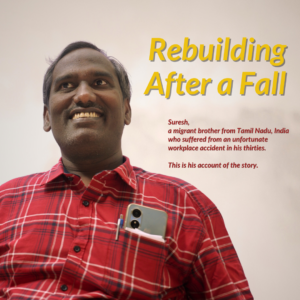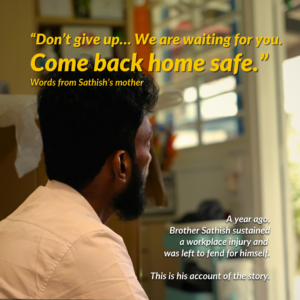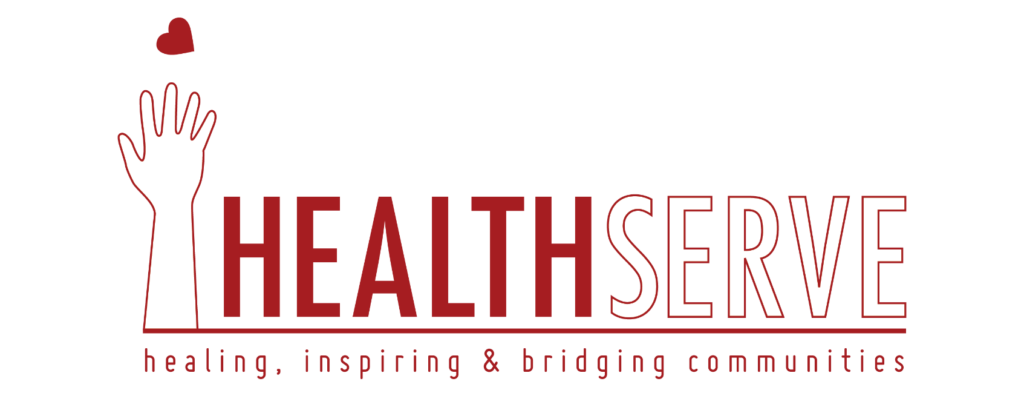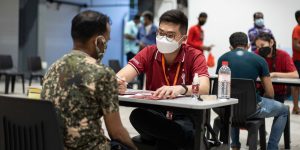
Ask any staff or intern at HealthServe, and they’d agree that it’s very hard to catch Jivee for an interview. Though he’s one of our Desker residents, he’s always out and about. So when I saw Jivee walk in gingerly, I was both surprised and worried. He looked like he was in pain and it did not sit right with the fit-guy impression I had of him.
I learnt that his work injury was acting up again and his back was in pain. But what hit me was the way he said it- like it did not hurt that much. Yet the way he winced was bad enough that I felt a bit of that pain too. One thing I’ve learned from my internship at healthserve is that some things are taught, but most things are caught. He did not say it but his movements made it clear that it hurt (probably a lot). I saw how he was not one who whined, or complained. Even before we sat down to talk properly, he was washing the dishes quietly. And for anyone who has had a back injury, it takes grit to complete tasks which are more difficult for one with a stiff and weakened torso.The first thing I caught about Jivee was that there was barely any self-pity for his situation; indeed, he goes around in his life without using his situation as an excuse.
Jivee hurt his back in 2017 when he fell off the stairs; his legs caved in from carrying a 20kg weight up and down 7 floors thrice. He has been living in our Desker shelter ever since. Because of his injury, he is not able to draw a proper salary- and that worries him because it means his 3 children’s education might have to take a back seat. “School starting soon” he says, but he does not have money to send home.
When I first sat down with Jivee, I expected to hear a flat recount of how he injured his back at work. These expectations were drastically revised when he opened with “ last time, first wife, die”. I think after hearing that, any feeling person would at least straighten up from their seats.It turned out that Jivee had grown up near the sea back in India, and also eked out a living there as a fisherman. But if his early days there were idyllic, these halcyon days did little to prepare him for the day when the sea receded far from the shore.The unexpected tsunami wiped out his home, and caused him to lose his wife and baby daughter. That revelation was enough to leave me speechless- but when i probed further, I learnt that there was a list of other family members and relatives that did not survive the catastrophe. Knowing his inclination toward understatements, I had to use my imagination for whatever he did not elaborate on to do justice to what he must have gone through. Yet I could not even fathom how terrible it must have felt to come together with the remnants of one’s family to mourn the mass of departed relatives.
Throughout this sharing, Jivee was sombre but collected. In his tone, I could not find the bitterness or anger I expected him to harbour at life or god (if he believed in one). When something like this happens, how do you get over the disbelief, denial and anger?It was then I realised many of us feel entitled to a good life. Getting peeved and impatient at inconveniences such as glitches in our transport system, or challenges with difficult people at work or in school- all these seemed so inconsequential in comparison to Jivee’s ordeals. His quiet resilience moved me; he neither complained nor expected to be given credit for pulling through.






